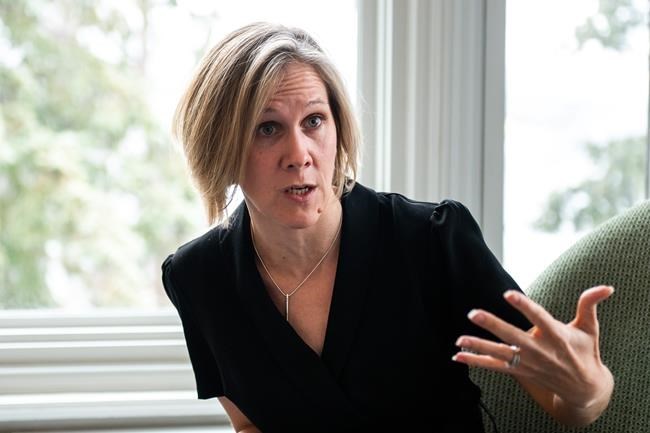OTTAWA — Britain is seeking closer ties with Canada as it reshapes its foreign policy in the wake of its departure from the European Union but London is also looking for Ottawa to boost its defence spending.
"In an increasingly contested world, democracies need to out-collaborate and out-compete countries that might try and destabilize the world order," U.K. High Commissioner Susannah Goshko said, in a wide-ranging interview with The Canadian Press.
"That concretely is the space that the U.K. and Canada are in."
The United Kingdom updated its national security and foreign policy last month following uncertainty after its exit from the European Union and tumultuous politics under prime ministers Liz Truss and Boris Johnson.
The new plan lays out priorities for the U.K. through to 2030, including expanded connections with Canada on everything from artificial intelligence to sanctions.
Goshko said a major focus in Canada will be scaling up scientific research and work on critical-mineral supply chains, with ministerial visits planned for this year.
"We have a great science and innovation network here in Canada (as) the U.K., and we've got money to fund research and collaboration."
Goshko said that means partnering in artificial-intelligence projects and sharing expertise in recycling through the circular economy. It also means working together to access the minerals required for electric vehicles.
"Canada has masses of these deposits. We have the City of London that knows how to finance these kinds of initiatives. There's potential opportunity there," she said.
In March, the U.K. government hosted a delegation of Métis and First Nations experts in environmental stewardship, to help form London's approach to environmental, social governance frameworks that will guide investments in projects aimed at achieving carbon neutrality.
"Thought-leadership really matters, so that we're not baking into our supply chain into the future the sorts of things that our successors will be trying to unpick for years to come, because we haven't thought from first principles, about how are we making sure that this is sustainable and ethically developed," she said.
"The integrated review cements that as one of the core planks of our bilateral relationship."
Beyond science, Goshko says Britain wants to be a team player for countries that espouse democracy and the rule of law, as an alternative to rising authoritarianism.
The U.K. strategy points to Canada as a partner in "standing up to economic coercion" through free trade and fair competition.
It also says that Britain's "Indo-Pacific tilt" aligns with the strategy Canada issued last November for the region.
Ottawa is seeking to limit partnerships with Beijing to issues like climate change, allowing for investment while warning of risks, and is seeking ties with other countries to counterbalance China's growing assertiveness. Goshko said that parallels Britain's thinking.
A rising China is one of the reasons why Britain is on track to increase its military spending above the target set for members of the North Atlantic Treaty Organization.
Britain has generally stuck to that metric, which is two per cent of gross domestic product, but is planning now to reach towards 2.5 per cent. That extra spending partially would go to replacing equipment sent to Ukraine, and also to join a nuclear-powered submarine pact with Australia and the U.S., known as AUKUS.
Canada last spent 2 per cent of its GDP on military in the 1980s, and a recent media leak suggested Prime Minister Justin Trudeau said Canada would never make that benchmark. The issue continues to chafe allied countries.
"We've always been really clear on this that NATO is really important to all of our collective security. And we're really clear that we would encourage all countries to meet their 2 per cent NATO spending commitments," Goshko said.
"What Ukraine has shown is that we can't afford to be complacent about our security — and I'm not suggesting Canada is," she said.
Britain's updated strategy does not call for more immigration from countries like Canada, despite calls for more labour mobility. This past weekend, Liberal party members endorsed a resolution from the party youth wing calling for "a free movement area between Canada, Australia, New Zealand, and the U.K."
That would allow citizens of each to live or work in the other countries with little hassle.
Britain however calls for tighter measures to crack down on illegal migration into Britain. London is already trying to send asylum claimants to Rwanda, though the arrangement is facing legal challenges.
This report by The Canadian Press was first published May 8, 2023.
Dylan Robertson, The Canadian Press



